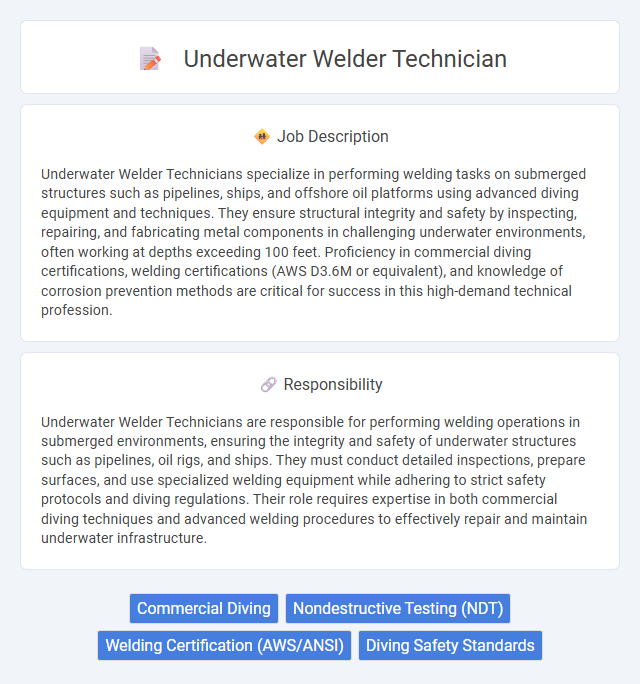
Underwater Welder Technicians specialize in performing welding tasks on submerged structures such as pipelines, ships, and offshore oil platforms using advanced diving equipment and techniques. They ensure structural integrity and safety by inspecting, repairing, and fabricating metal components in challenging underwater environments, often working at depths exceeding 100 feet. Proficiency in commercial diving certifications, welding certifications (AWS D3.6M or equivalent), and knowledge of corrosion prevention methods are critical for success in this high-demand technical profession.
Individuals with strong physical fitness and excellent swimming capabilities are likely to be suitable for an underwater welder technician role due to the demanding nature of working in high-pressure underwater environments. Those who are comfortable with confined spaces, have good hand-eye coordination, and possess the ability to stay calm under stressful conditions may find this job fitting. People with a fear of water or claustrophobia might encounter challenges in adapting to the job's requirements.
Qualification
Underwater welder technicians must possess specialized qualifications, including commercial diving certification and welding credentials such as AWS D3.6 or ASME Section IX. Proficiency in underwater welding techniques like dry welding and hyperbaric welding is essential, alongside strong knowledge of safety protocols and the ability to work in high-pressure, low-visibility environments. Physical fitness, excellent hand-eye coordination, and experience with underwater inspection tools enhance job performance and ensure compliance with industry standards.
Responsibility
Underwater Welder Technicians are responsible for performing welding operations in submerged environments, ensuring the integrity and safety of underwater structures such as pipelines, oil rigs, and ships. They must conduct detailed inspections, prepare surfaces, and use specialized welding equipment while adhering to strict safety protocols and diving regulations. Their role requires expertise in both commercial diving techniques and advanced welding procedures to effectively repair and maintain underwater infrastructure.
Benefit
Underwater welder technicians likely experience high earning potential due to the specialized skills and hazardous nature of their work. The job may provide opportunities for travel and work in diverse aquatic environments, appealing to those seeking adventure and variety. There is a probable demand for skilled technicians in industries such as offshore oil, marine construction, and ship repair, suggesting stable employment prospects and career growth.
Challenge
Underwater welder technicians likely face significant physical and technical challenges due to working in deep, pressurized environments with limited visibility. The probability of encountering hazardous conditions such as strong currents and equipment malfunctions requires high levels of skill, precision, and safety awareness. These challenges demand continuous training and adaptability to maintain effective and safe operations underwater.
Career Advancement
Underwater Welder Technicians gain valuable expertise in welding, inspection, and repair of subsea structures, pipelines, and vessels, enabling progression to supervisory or inspection roles within offshore and marine industries. Advanced certifications in commercial diving and specialized welding techniques lead to higher positions such as Diving Supervisor or Offshore Welding Engineer. Continuous skill development and experience in hazardous environments significantly enhance career growth opportunities and salary potential.
Key Terms
Commercial Diving
Underwater welder technicians specializing in commercial diving perform critical maintenance and repair tasks on underwater structures such as oil rigs, pipelines, and ship hulls. They utilize advanced welding techniques, including arc welding and cutting, while operating in challenging marine environments requiring specialized diving certifications and safety protocols. Proficiency in underwater welding extends the lifespan of submerged infrastructure and supports offshore construction and inspection industries.
Nondestructive Testing (NDT)
Underwater Welder Technicians specializing in Nondestructive Testing (NDT) utilize advanced techniques such as ultrasonic testing, magnetic particle inspection, and radiographic methods to evaluate the integrity of submerged structures without causing damage. Proficiency in NDT ensures early detection of weld defects, corrosion, and structural weaknesses, critical for maintaining safety and compliance in offshore oil rigs and underwater pipelines. Expertise in NDT technology and underwater welding standards significantly enhances operational reliability and minimizes costly repairs.
Welding Certification (AWS/ANSI)
Underwater Welder Technicians require specialized Welding Certification, predominantly from AWS (American Welding Society) or ANSI (American National Standards Institute), to ensure compliance with industry standards and safety regulations. These certifications validate expertise in underwater welding techniques and materials, critical for maintaining structural integrity in marine environments. Holding AWS or ANSI welding certificates enhances job opportunities and demonstrates proficiency in high-pressure, hazardous underwater welding operations.
Diving Safety Standards
Underwater Welder Technicians operate under strict diving safety standards to prevent accidents and ensure operational efficiency. Compliance with organizations like the Association of Diving Contractors International (ADCI) and adherence to protocols such as proper decompression procedures, use of blowout preventers, and continuous monitoring of atmospheric conditions are critical. Regular training in emergency response and the use of specialized diving equipment further enhance safety during underwater welding tasks.
 kuljobs.com
kuljobs.com